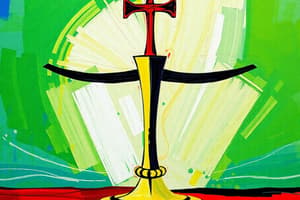Podcast
Questions and Answers
Which branch of the US government is responsible for interpreting laws and serving as the ultimate arbiter of the Constitution's meaning?
Which branch of the US government is responsible for interpreting laws and serving as the ultimate arbiter of the Constitution's meaning?
- Executive Branch
- Administrative Branch
- Judicial Branch (correct)
- Legislative Branch
What is the primary role of the Legislative Branch in the United States?
What is the primary role of the Legislative Branch in the United States?
- Interpreting laws
- Approving presidential appointments
- Overseeing federal spending
- Enacting federal laws (correct)
Who leads the Executive Branch in the United States?
Who leads the Executive Branch in the United States?
- The Vice President
- The Chief Justice
- The President (correct)
- The Speaker of the House
Which branch of the US government carries out and enforces federal laws, and represents the country in international affairs?
Which branch of the US government carries out and enforces federal laws, and represents the country in international affairs?
What constitutional principle ensures that no single branch of government can become too powerful?
What constitutional principle ensures that no single branch of government can become too powerful?
What power does the legislative branch "check" the President?
What power does the legislative branch "check" the President?
Which power does the executive branch have over laws?
Which power does the executive branch have over laws?
What is a key role of the judicial branch in relation to laws?
What is a key role of the judicial branch in relation to laws?
How does the principle of separation of powers prevent dominance by a single branch?
How does the principle of separation of powers prevent dominance by a single branch?
In what way does the separation of powers foster a more equitable society?
In what way does the separation of powers foster a more equitable society?
Flashcards are hidden until you start studying
Study Notes
The Principle of Separation of Power
The principle of separation of power is a foundational concept in the design of democratic governments, ensuring that no single entity holds unfettered authority. This concept, which originated in the 18th century with philosophers such as Montesquieu, has shaped the structure of many modern governments, particularly the United States.
The Three Branches of Government
In the United States, the separation of power is realized through the existence of three distinct branches of government:
-
Executive Branch: Led by the President, the executive branch enacts federal laws and policies, supervises the bureaucracy, and represents the country in international affairs.
-
Legislative Branch: Made up of Congress, the legislative branch creates and passes laws, approves presidential appointments, and oversees federal spending.
-
Judicial Branch: Headed by the Supreme Court, the judicial branch interprets the laws, resolves disputes, and serves as the ultimate arbiter of the Constitution's meaning.
Each branch has its own set of powers and responsibilities, allowing them to act independently while also holding each other accountable.
Checks and Balances
The principle of checks and balances ensures that no single branch can become too powerful. The three branches of government have various mechanisms for limiting the influence of the others:
- The legislative branch has the power to impeach and remove the President and federal judges, and it approves presidential appointments.
- The executive branch has the power to veto laws, enforce laws, and nominate federal judges and high-ranking officials.
- The judicial branch has the power to declare laws unconstitutional and enforce constitutional principles.
These checks and balances serve to prevent any single branch from becoming too dominant.
The Separation of Power in the United States
The principle of separation of power and checks and balances has been a cornerstone of the United States' political system. For example, the legislative branch can impeach the President if they are found to have committed high crimes or misdemeanors. Similarly, the judicial branch can declare laws unconstitutional if they contradict the Constitution.
The separation of power also ensures that different perspectives are represented in the government. For instance, while Congress and the President represent the people's will, the judiciary upholds constitutional principles. This balance allows for productive debates about policies and laws, ultimately leading to a stronger and more just system.
In conclusion, the principle of separation of power and checks and balances is a vital element of the United States' political system. By ensuring that no single entity has unfettered authority, the separation of power fosters a more just and equitable society.
References:
Studying That Suits You
Use AI to generate personalized quizzes and flashcards to suit your learning preferences.




